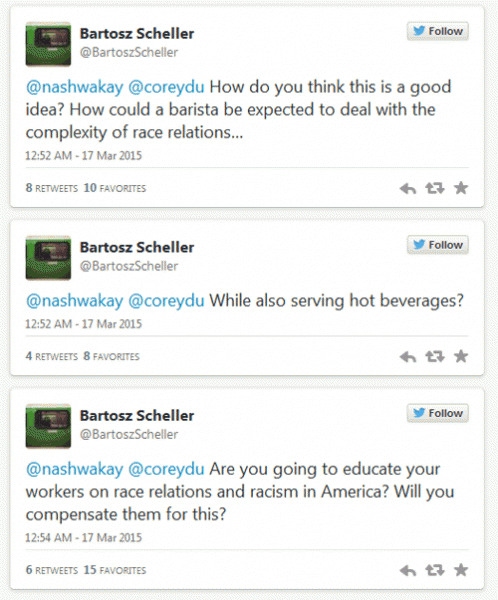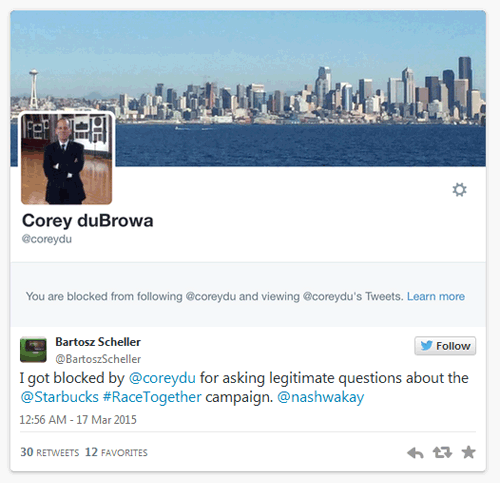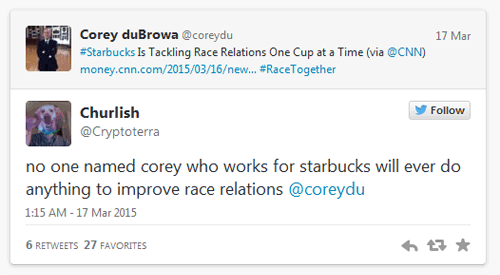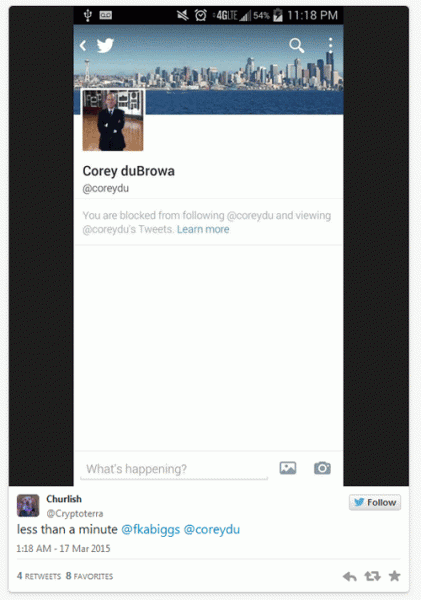When I first saw the TV advertisement for the ill-advised Starbucks #RaceTogether campaign, where Starbucks’ employees were going to talk to people about race relations, I thought to myself, “This definitely is not going to go well for Starbucks.”.
Looks like I was right again. As usual..
Starbucks executive Corey duBrowa couldn’t even handle a few very tame, non-vulgar and non-threatening tweets, just asking questions, and banned just about anyone who tweeted something duBrowa didn’t want to be bothered with.
After more questions came in, Corey duBrowa just deleted his whole Twitter account to stop the race conversation that Starbucks started.
After asking only three very civil questions asked of Corey duBrowa, and this Twitter user was completely banned by duBrowa.
This twitter user was banned by duBrowa after only one Twitter post.
How does someone like Starbucks executive Corey duBrowa, who is soo thin skinned and weak, get off telling his young employees to talk to people about race relations in America, when he can’t even have a racial conversation on Twitter?
Starbucks and Corey duBrowa are both totally lame!
Starbucks executive Corey duBrowa recently deleted his twitter account, after what he said were abusive comments as a result of his push for a campaign in which his baristas were to engage with customers about race relations.
“I was personally attacked through my Twitter account around midnight last night and the tweets represented a distraction from the respectful conversation we are trying to start around Race Together,” duBrowa said. “I’ll be back on Twitter soon.”
But the whole point of the conversations he promoted, was to get people talking about what is uncomfortable, and controversial. It seems childish to delete his own twitter account over it.
A story from fastcocreate.com showed just what happens when you walk into a Starbucks wanting to engage in a discussion on race. Pretty much nothing. The baristas are young kids, just trying to do their job and get through the day, and are kind of embarrassed to even bring it up. I kind of feel sorry for them.
It is the fault of the mindless executives who put the Starbucks’ employees through this, which is why I’m not a big fan of boycotts. It’s not the employee’s fault, they just have a job to do, and the money at the top is usually not as hurt as the kids making coffee.
But a friend of mine named Paul made a brilliant point.
If Starbucks wants us to talk about race, let’s start with why they don’t have Starbucks Coffee Houses in some of America’s cities that are mostly black, or have had a racially charged history?
My friend looked up various cities, and found that there are no Starbucks Coffee Houses in many of them.
Places like Highland Park, Michigan, which is at the center of Detroit, is inhabited by a population that is 94 percent African-American. Or in Benton Harbor, Michigan, which is almost 90 percent African-American. There is not a Starbucks in either town.
There is not a Starbucks in East St. Louis, Illinois, in which 98 percent of the population is African-American. Nor is there one in Gary, Indiana, whose population is 85 percent African-American.
The recent remembrance of the march on Selma, Alabama had the president walking down the street with many people who fought for civil rights, but once again, Selma doesn’t have a Starbucks. Neither does Ferguson, Missouri.
Here is the point, if Starbucks wants to have a conversation about race, perhaps they should explain why they are not accessible to most of those they claim to advocate for and champion. If being of a different race than white is higher on their list of desirables, why isn’t Starbucks putting their money where their mouth is?
Stand Up To Government Corruption and Hypocrisy – usbacklash.org




